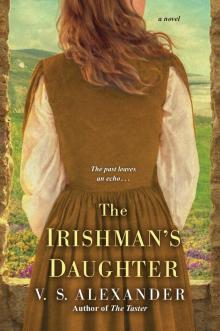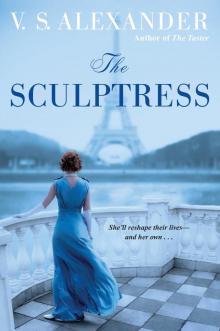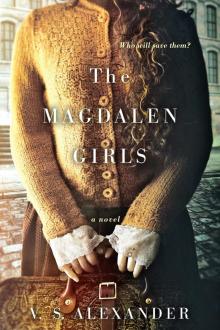- Home
- V. S. Alexander
The Irishman's Daughter Page 29
The Irishman's Daughter Read online
Page 29
A scream shattered his thoughts and he rushed out of the cabin. Midway up the slope toward Lear House, he spotted Brian and Aidan Golden clutching Mrs. Golden as she extended her thin arms between the lintels surrounding the door to her home. The woman clamped her fingers onto the wood and refused to budge. Their two children cowered behind her dress.
Her anguished howls fractured Rory’s heart. “It’s my home—I’m not leaving!” She continued to cry out until her husband finally clawed her away. She collapsed against him and then fell, sobbing, to the ground. The children rushed to their mother and threw their arms around her. Aidan and Brian leaned over her as she wailed into the ground.
Rory shot an angry look toward the constable and the armed men. Most stood in a row, leaning against their weapons. Six of the dragoons had positioned themselves at the wagon. The men off-loaded a wooden apparatus that stood like an inverted V. Soon thick chains and a heavy log, the full length of a man, were strapped to the crude machine. He knew what it was—a battering ram to destroy the cabins. Their homes would be smashed to pieces until there was nothing left. Then the land would be cleared.
Aidan disappeared into the cabin as Brian comforted the distraught woman.
The few who remained walked down the slope. Jarlath and his family, Noel and his wife and children, the others, all were walking away from the land that had been their home for generations. They gathered near the constable’s horse, which was tied to a bush loaded with a late summer profusion of leaves on the cusp of turning from green to gold. The children clambered about it, engrossed by the animal. They didn’t realize they would have no home in a matter of hours. Soon they would have no food, no place of shelter from the late summer weather.
He couldn’t stand to see his father-in-law so preoccupied with another home when his own was about to be destroyed. He hurdled the fences and potato ridges to reach him and then put his hand on Brian’s shoulder.
Brian looked up as he held the woman. “There’s nothing I want. If it all has to go, it goes.”
Why was his father-in-law giving up so easily? Didn’t he want to save any of the memories that lived within the cottage? What about his wife’s crucifix that Briana had admired so often? The man who comforted the grieving woman was giving up not only on his claim to land but his life.
He only had a few minutes before the men would start—enough time to go to the cottage and then return to get his bag. The men were setting up the ram in front of his door. His home would be the first to go.
Rory, propelled by a mixture of fury, horror, and sorrow, ran to the cottage. The books in Lucinda’s bedroom, the simple furniture that had lasted for centuries, would be gone. Nothing could be done about that. He went into Brian’s bedroom and gathered the crucifix and a small chalk drawing of his deceased mother-in-law. At least he could save those things for Brian. He ran out the door knowing it would be the last time he would set foot inside its walls.
Davitt was giving the order to begin when he arrived at his cabin. He glared at the man. “Give me a minute to gather my bag.” The officer nodded and held up his hand to stop the order.
Rory took a deep breath as he stepped inside. The cabin smelled of the smoky odor of burned peat, the scratchiness of the straw. He muttered a quick prayer, said good-bye to his home, and, after placing the drawing and crucifix in his bag, clutched it to his chest.
He stepped out of his cabin and closed the door.
The men pulled the ram into position near the entrance.
Rory stepped away, watching his father-in-law walk down the hill with the Goldens and their children.
Out of the corner of his eye, he saw Davitt give the signal.
He didn’t want to watch, but he couldn’t stop from hearing the sound as he walked away. The chains creaked, the air rushed as the log hurtled toward the door; but even more distressing was the awful crash, the splintering shock, as the wood smashed to pieces. After that, the heavy thunks continued as the ram battered his earthen cabin into bits of sod.
* * *
Sir Thomas Blakely stretched his legs on the brocade ottoman in the grand salon of his Manchester home and sipped brandy from a crystal snifter. The Andersons and the Rogerses had departed a half hour earlier, so he no longer had to play the host. Only the housekeeper and the valet scurried about the dining room, removing the porcelain dinner plates from the mahogany table before carrying them to the kitchen. He observed that “his man” was acting more as a superior to the housekeeper than as a helper by ordering her about. That was the way it was supposed to be in all grand English homes, particularly in one run by a gentleman.
He took another sip of the pale French brandy, placed the snifter on a side table, and gazed at the blazing fireplace set into the far wall. The birch logs hissed and popped, sending an occasional shower of sparks arcing toward the fire screen. The sun was setting, and he took pleasure in watching the light fade across the lawn, throwing the linden and ash trees into deep shadows. His mood was as dark as the nascent evening.
Since the shooting at Lear House, entertaining had not been foremost on his mind. He found himself wandering the house during tedious days, finding little comfort in his business dealings, and thus, alone and miserable, forced into early retreat to his bedchamber. His shoulder still ached, and he found it uncomfortable to sleep without the aid of laudanum. The combination of liquor and opium usually served its narcotic purpose, but often he found himself startled awake at night, his bedclothes soaked in sweat.
As far as visitors were concerned, the Wards and their three sons were seldom seen because he couldn’t stand the noisy commotion created by the boys. If their parents stifled them, the children turned sullen and silent, which was often worse than the exuberance they naturally exhibited. He had restricted the Wards’ invitations and often refused those he had received, developing a newly found appreciation of Lucinda’s skills as a governess.
He was also tired of the constant badgering by the Wards—the Andersons and Rogerses were included in this scheme—for him to find a suitable wife. Yes, there were a handful of potential companions to choose from, but he found them vapid and vacant of the charms he wished from a woman. None of them exhibited the slightest room for maneuvering, no willingness to take a chance, no joie de vivre, except for beaming faces if he mentioned ledger books or plans to attend a horse race or gala ball. He was bored by those amusements and sought other pleasures than those trifles from a suitable wife—pleasures he sometimes found himself ill-equipped to define.
The valet appeared at his side and asked if he required further service. He declined, adding that he would take to his bed shortly, but asked his man to fill the washbasin and make sure his nightclothes were laid out. The servant bowed and left the room.
Sir Thomas returned to his brandy and thought about the prospect of marriage his friends’ badgering had produced. One woman, handsome with a zest for life, fired his imagination, but she was already married to a poor farmer. In his dissolute way, he had admired her for many years, and his feelings had been brought to the forefront by his last visit. How strange that the famine and his brush with death could focus his attentions on a woman. Previously, his business and social obligations and his parents had stood in the way of anything he desired. Those restrictions were gone now that his mother and father had died within weeks of each other in the past year. Fortunately, his father’s will made no mention of marriage or whom he was to marry, and thus was incontestable. So the door had been opened to a vault that had been sealed by his parents.
By the time he’d had any chance to act on his imaginative fancy, the marriage had been carried out in Ireland. He’d kept his eye on Briana skillfully through her sister, only to have the prize wed another, a man beneath even her station. He understood that Briana was below his standing, but obsessive thoughts of love were hard to scour from the mind amid the chance that somehow all could be rearranged.
The fire deepened from orange to crimson, and the melancholy
atmosphere of summer shifting to fall overtook him. He sank back in his chair, mentally fretting about the lackluster days to come, the short-lived beauty of golden leaves, the falling temperatures that would turn the moist, pliable earth to frozen hardness.
The woman he dreamed of was independent, her own thinker, headstrong but not obstinate, a woman who participated in life rather than eschewed it for societal convenience. That was the woman he wanted to marry. He hadn’t yet found such a prize in England, so Briana dominated his fevered thoughts. He slapped his head sometimes hoping to get her voice, her features, out of his head, knowing that his life would be easier and more rational if he was rid of her.
Lucinda was nothing like Briana—he had known that from the time he had met them both years ago. She was stern, lacking in the kind of vitality he wanted—intelligent, yes; comely, no, but not hideous by any means. He had kept the governess around as a charm, a route to Briana, but the good-luck piece hadn’t paid off, and the years had drifted by as his parents kept tight control of his ways and means.
Now that he was free, why didn’t she realize how much he could do for her? Was she unable to comprehend how he could release her from the trouble and worry of a life that kept her one step away from falling into a pit of poverty and despair? He had even hoped to impress her with the ball he had thrown at Lear House, only to get shot for his trouble.
The question that kept him awake at night was, How can I change her mind? That question was easier to ask than to solve. The family was complex: Briana would have nothing to do with him now that she was married; his relationship with Brian was strained. He had observed Lucinda’s fawning ways toward him and disregarded her attention except when it came to news of Briana. Considering the Walsh family, there was little chance that Briana could grow to love him even if he offered to bring the entire family to England.
The shooting had changed him. Now he realized how life could shift in an instant, and, as surely as one day follows another, desires could be fulfilled only if you worked toward them. Money, parties, all the licentious trappings of life were useless when it came to true love.
He drained the remaining brandy and set the glass on the table. The housekeeper would pick it up and tend the fire before she went to bed.
He yawned and rose on legs stiffened by the tension of his thoughts. He climbed the stairs, entered his bedchamber, and closed the door. Illuminated by candlelight, the milky liquid of laudanum sat on the night table next to his bed. He drank a draft before turning in and hoped that his sleep would not be interrupted yet again by strange dreams. It was a wish in which he had small confidence.
* * *
The Newton on Beacon had been their home for several weeks, but Briana, instead of finding it comfortable and homey, found it gloomy and depressing. She had taken a mild dislike to the building when she and Lucinda had first arrived on its steps. It was brick, flat and plain, but taller at three stories than she had imagined. They paid a month’s worth of room and board, about fifteen dollars, for a top-floor room near the back of the building with a window that looked out upon a similar structure.
The woman who registered them flaunted her long, glorious Boston history and English heritage, and eyed them with a suspicious squint. Nevertheless, money won out and the last available room became a temporary home.
She wrote to Rory as soon as they arrived and posted the letter at the front desk. She had no idea whether it would make it to Lear House or whether he and her father would still be there.
As September drifted on, the weather changed: The wind sharpened to a pronounced chill, the clouds thickened, the leaves fell in profusion from the few trees on the open greens, the days grew dark by late afternoon. Fall added to Briana’s dull mood. There was no getting around it—she missed Rory, her father, and Ireland—and the thought of having a baby in a foreign country depressed her because she likened it to not having a permanent home for her child. She often found herself staring out the window into the neighboring building, a warehouse as far as she could tell. Men hauled large crates into the empty spaces and arranged them until nothing showed in the window except wooden slats.
Both of them found it hard to make friends—even Lucinda who, on the whole, could be more gregarious than Briana because of her teaching experience. The women who dined with them at the house were mostly American or English rather than Irish. The Americans came from strange places Briana had never heard of like Vincennes, Indiana; Schenectady, New York; or coal-mining cities in northern Pennsylvania. A woman from one of the latter settlements told them that the Irish were “infiltrating” her hometown and that she wanted nothing to do with them. In fact, that was one of the reasons she’d left—because the Irish were taking away jobs meant for Americans. After that pronouncement, the woman turned on her heel and stalked away.
Failing to make congenial friends, they took it upon themselves to look for work on their own but found jobs scarce. Briana soon realized that the NO IRISH NEED APPLY signs in the windows were meant for them despite whatever hope she might hold out for even a menial job.
One mid-September Sunday morning, after a night of cold rain, the gray clouds pushed off to the southeast and the early morning sun blazed against the bricks. When they returned to their room after breakfast, Briana pulled the small chair in the room to the window and stared out across the rooftops. A hard blue sky to the north beckoned.
“Well, I’m certainly not going to sit in this room all day and wait for something to happen,” Lucinda said while pulling on her sweater. “I’m going to search for any new Help Wanted signs.”
Briana ran her hands over the bump on her stomach, her child now entering its fifth month, and wondered what excuse she could come up with to get out of looking for a job. The task had frustrated her beyond all measure and taken an emotional toll that had begun to border on physical resistance. “Can we take a walk by the river or at least do something fun today? We’ve looked for work for three weeks.” Briana pictured herself barefoot walking along the cliffs at Carrowteige, enjoying the sun and the crash of the waves.
The baby kicked in the womb, and Briana patted her abdomen, acknowledging the strange sensation. She longed to see something besides the insides of shops and manufacturing concerns, to have conversations other than those with arrogant, surly men and rude women.
Lucinda fidgeted with the buttons on her sweater. “You can stay if you wish, but I’m worried about money—we’ve gone through it faster than I’d hoped.” Her sister’s eyes flashed. “Don’t fool yourself. We can’t carry on like this for long. Not only are we outcasts, but employers can see you’re pregnant. I’d do my best to hide it.”
“I’ll do no such thing.” She turned and stared out the window, although she realized that there was a great deal of truth in her sister’s words. “I’ve applied for positions as laundress and housekeeper and gotten nowhere,” Briana countered. “I’m afraid I have too little to offer Boston. I don’t have the teaching skills that you do.”
“We have to try harder,” Lucinda said, wiping her handkerchief over her scuffed shoes. “Do you remember the name of the man who saved us from those horrible brothers when we arrived in Boston?” She stuffed the handkerchief back in her sleeve. “I believe it was Declan . . . Coleman?”
“Yes, why?” Briana had committed the man’s name and address to memory because she instinctively felt she could trust him. In the back of her mind she thought one day they might have to call on him despite their initial urge to strike out on their own.
“Mr. Coleman said we could call on him for help. Considering our luck so far, I’m willing to try anything. I’m going to pay him a visit in—”
“South Cove.”
“Yes, that was it.” Lucinda started for the door. “What was the address?”
“Ten Royal Street,” Briana said, and rose from the chair. “I may go for a short walk while you’re out.”
Her sister shot her a withering look. “Don’t exhaust yourself.”
She took a room key hooked to the wall and walked out.
The other key glinted in the light. Briana sat again for a few more minutes before freshening up in the bathroom at the end of the hall. Most of the women had already left the house. As she dried herself with a towel, she decided to journey past Long Wharf to an area near the waterfront where many Irish immigrants lived. She longed to reconnect with her people even though she was in Boston. Her face flushed as she fought back tears. She was homesick.
* * *
Briana made her way to the waterfront and then north until she was in the shadow of the white spire of Christ Church steeple. The walk cheered her, and she found herself stepping with more energy than she’d had in days. The sun warmed the clean, crisp air until she ventured into the heart of the Irish district. She had heard from the less-than-kind proprietress of the house that there were “swarms of bog burners” scattered throughout Boston; in fact, too many for her taste. She added, however, that if not for the Irish, Boston’s swamps wouldn’t get filled in, nor fancy houses built.
A strange odor filled the air around her as she walked through the lane that divided the flat, wooden buildings. Its greasy hardness drifted from the windows of the densely packed homes. The sizzling smell of fried potatoes carried on the air, a way of cooking little known in Ireland. And there were other odors as well: the bile-inducing odor of human waste after the slop jars were emptied on the muddy street, the potent stench of urine pooled in doorways, the dregs of stale liquor and beer drained against the sides of buildings.

 The Irishman's Daughter
The Irishman's Daughter The Sculptress
The Sculptress The Taster
The Taster Her Hidden Life
Her Hidden Life The Magdalen Girls
The Magdalen Girls